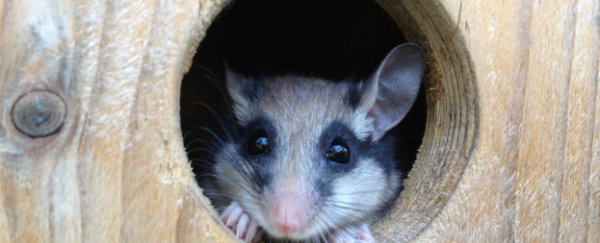Scientists have discovered that the cells of European dormice age more slowly the more frequently they enter torpor - a short, temporary form of hibernation that's triggered by a lack of food or drop in temperature.
The research, which involved ecologist Dr Christopher Turbill from the Hawkesbury Institute for the Environment in Australia, studied the impact of torpor on European garden dormice that enter torpor regularly in the lead up to winter.
Each year animals in cold regions have to race to put on weight and store enough energy to last them through a winter of hibernation - in particular, individuals born in autumn struggle to get hibernation-ready.
To help them catch up, these late-born individuals often use torpor to help them fatten up before winter.
The scientists, led by a team from the University of Veterinary Medicine, Vienna, decided to investigate how the amount of time garden dormice spend in torpor impacts the ability of late-born dormice to build up energy stores, as well as their cellular ageing during hibernation.
To do this, they separated late born individuals into two groups - one that was made to fast intermittently, and another that had access to as much food as it liked. The dormice that were made to fast ended up going into torpor far more often than the dormice that could eat freely in the lead up to hibernation.
They found that entering torpor regularly in the lead up to hibernation helped the dormice that fasted intermittently to put on as much weight as the dormice that ate normally.
Interestingly, they also showed that dormice that woke up from hibernation more often experienced a faster shortening of telomeres - the caps at the end of chromosomes that control cellular ageing. Longer telomeres are associated with slower ageing and better overall health than shorter ones.
Their results have been published in the Journal Proceedings of the Royal Society B.
In order to determine how long the dormice had spent in torpor, they measured the temperature changes in their nests - when the mammals are in torpor, their body temperature drops sharply, and the nests get a lot cooler.
"The longer an animal stays in torpor, the more energy it saves," said Sylvain Giroud, an ecologist who led the study, in a press release.
At the start of the study, there was no difference in the telomere length of the two groups. But interestingly, after hibernation, the cells of those that had frequently entered torpor before hibernation had longer telomeres than those that hadn't.
Torpor has long been suspected of slowing the ageing process, but this is the first study to find a functional link between the amount of time not spent in torpor at a high body temperature (known as euthermic temperatures) and telomere length, which is an indicator of the rate of ageing over winter.
"Our data indicate that the main effects of hibernation on ageing processes are linked to euthermic episodes which are associated with the shortening of telomeres, an indicator of ageing," the researchers concluded.
The scientists are now looking into whether early-born dormice, that don't have to rush to put on weight before winter, will have similar ageing patterns.
"We hope to unravel the mechanisms involved in torpor use and ageing processes in individuals facing contrasted environmental conditions during their early life," said Giroud.
We're also hoping that some time soon someone will find some similar benefits to napping in humans, because we're really tired.
Love the environment? Summer and Honours Scholarships are now available with The Hawkesbury Institute for the Environment. Applications close 5th December, apply now.
